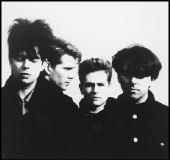The other day, I had lunch with a friend I hadn’t seen in a couple years. Tucking into her roast duck and lentil salad at a little bistro on New York’s Upper East Side, she mentioned that her birthday had just passed. Voice lowered, so the aging matrons on either side of us wouldn’t overhear, she added with mock horror that this year marked the big 3-0.
“I honestly think I’m getting cuter with age,” I retorted, ticking off examples. I stopped dying my graying temples last year and recently decided my encroaching crow’s feet offset the naﶥt頯f my brown saucer eyes quite nicely.
“That’s what happens when you start becoming comfortable with yourself,” my companion replied.
But am I genuinely comfortable with growing older or just making the best of my inevitable decline? Lately that conflict has been loitering in the back of my mind. And it isn’t just the fact that I pay the rent reviewing albums by (alleged) youngsters like ‘N Sync and Mandy Moore that keeps throwing this question up in my face, but rather the persistence—and outright protestations—of musicians I admired when I was but a youth.
During my visit to Manchester last month, New Order’s Peter Hook and Bernard Sumner insisted they were mortally offended at the prospect of being tagged “retro” and that they crafted their forthcoming album, Get Ready, to compete with current chart acts . . . even as they defended using teenage stand-ins for their new video “Crystal.”
Back in N.Y.C. a few weeks down the line, my buddy Wes met me to a deliver a full report on seeing the reconstituted Roxy Music earlier in the evening. He lauded how they shortchanged Avalon and Flesh + Blood (i.e., the dreaded “mature” albums) in favor of “Do the Strand,” “Virginia Plain,” and “Mother of Pearl.” When he aped one of Bryan Ferry’s stage gestures, all I could think was, “How spry!” But spry is not a word applied to young people.
A minute later, I noticed the Clash’s Joe Strummer sucking down cocktails and holding court in the corner. He looked great, even better than when I saw him two years ago. “Does he moisturize,” I wondered, “or does the booze function as a preservative?”
But my truly disquieting brush with aging ’80s icons came while spending the 4th of July in Washington, D.C., when an old college friend and I went to check out Echo and the Bunnymen. The show itself was mesmerizing; Ian McCulloch remains rail thin, and his versatile baritone rang out on “The Cutter,” piercing through the stage lights and smoke. What sucked was the crowd, rife with cigar-chomping frat boys, drunkenly at the ready to shake their khaki-clad asses to “Lips Like Sugar” or any other cuts they recognized from the self- titled 1987 album that sounded the death knell for the band’s original incarnation.
“I just realized I only ever listened to Echo when I was depressed,” my date remarked after half a dozen songs. “And these are the same people that used to put me in that mood.” We left early. The prospect of these idiots yammering during the quiet bits of my favorite Bunnymen song, the oh-so-gradually building “Ocean Rain,” was enough to make me willing to miss the number entirely.
But McCulloch and company weren’t through with me. When I arrived back in Seattle and dug through the haystack of mail in my living room, I unearthed the 4-CD Echo & the Bunnymen: Crystal Days 1979-1999 (Rhino/Warner Archives). This 72-track collection, teeming with B-sides, alternate versions, and a generous selection of live covers (“Paint It Black,” “Soul Kitchen”), plus all the essential singles and album cuts, paints a much fuller picture of the band’s strengths than the 1985 best-of Songs to Learn and Sing. And the point-counterpoint running commentary from Mac and guitarist Will Sergeant is brutally frank and revealing.
Duly inspired, I dug out the most recent Bunnymen album, Flowers (Cooking Vinyl/spinART), which I had overlooked back in May. From Sergeant’s trippy noodling on “King of Kings” and “It’s Alright” to the “Sweet Jane”-esque bass line of “Buried Alive,” the pulse running through the band’s eighth studio album is as invigorating as anything from their early ’80s heyday. Mac’s lyrics on the eerie title track (“Here’s to all the things we’ll never/Here’s to all we could have done/Here’s to what became whatever”) may not make me feel less vexed about getting on in years, but the conviction of his delivery throughout certainly does.
“As the dinosaurs roam the earth, and ultimately (hopefully) become extinct, all that will be left is The Bunnymen.” So wrote one of my British colleagues back in 1984. Time seems to be bearing out that boast. Listening to Flowers, I look forward to sticking around to see the finish—gray hair, crow’s feet, and all.






